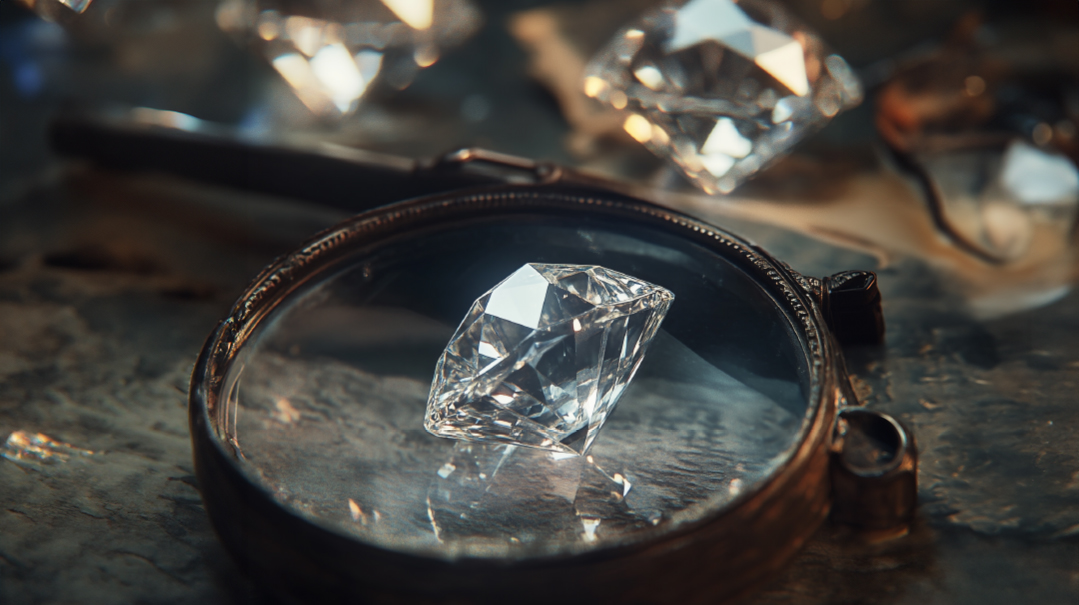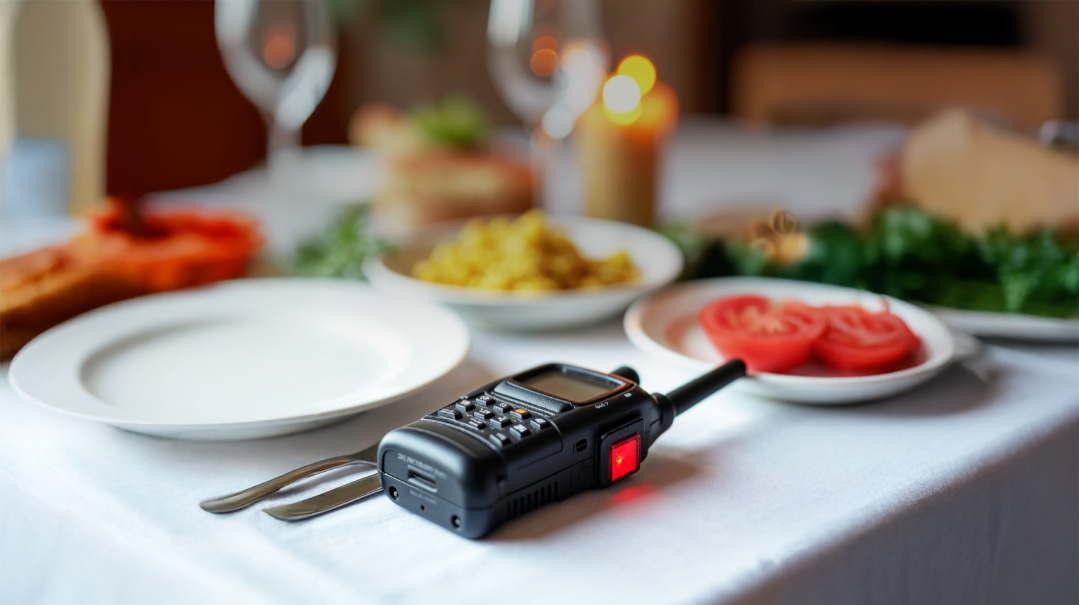Forgotten Facets
| October 13, 2024“What’s there to know?” my father answered. “She’s a girl. She’s eighteen. Erlich and tzniyusdig. I know her father. A good shidduch”

The first I heard about a pair of pants and a skirt being the only criteria for a match was the summer before I turned eighteen.
“Nu?” my father said quietly on my seventeenth birthday. “It’s time to rebuild, and to bring us nachas.”
My life was a pile of bricks I needed to build into something, the quicker the better.
If he could, my father would’ve made me a bar mitzvah when I was eight, just to get things moving. Another brick added to the edifice of Yiddishkeit slowly blossoming in Williamsburg. He would’ve plopped a yarmulke on my head before I let out my first wail and put me straight into yeshivah gedolah at my bar mitzvah.
I lucked out with the clear guidelines for upsheren, cheder, bar mitzvah, and yeshivah.
My luck ran out when I turned eighteen.
Shemoneh esreh l’chuppah, my father wrote in each of his letters to me. Our yeshivah went to camp in the summer. There was only one phone in the main office. Even after painstakingly sticking my fingers into the correct holes and being connected to the operator, I needed a miracle for the cord not to fly out of the jack.
My father reminded me about my birthday in every letter, broadly hinting, and then writing straight out that the day of camp homecoming would coincide with my meeting a girl. He also wrote about my responsibility to rebuild, to perform, to outshine. Not in those words exactly, but clear enough for me to be glad that I was a two-hour drive away from his belt and my mother’s pots.
I wondered if he’d let me shower and change before the meeting, or if the girl would meet us at the bus stop and help me with my suitcases.
My mother’s letters were all about questions. Is there enough food? Are you sleeping enough? Are you staying safe?
I was too well-bred to throw the letters away, but I wanted to.
As we headed to the frog-infested lake for our daily swim, I kvetched to Cheskel, my bunkmate, about my imminent engagement. He laughed and said, “Nu, nu, my father always says, ‘Vus darf men mehr vee ah shessel uhn ah puhr hoizen? What do you need more than a skirt and a pair of pants for a successful marriage?’”
Which was a funny way of putting it, considering the many different pairs of pants that made up my childhood.
Until I turned ten, I was sent to bed at seven every evening — summer, winter, spring, and fall. All the boys on the block threw balls into real or makeshift baskets while I was thrown into bed. If my father was home, it was done with a potch or two, and if it was my mother sending me to bed, it was with endless questions whether I was hungry, thirsty, sick, healthy, warm, or cold.
I gave up the fight very early on. As soon as my mother appeared at the building entrance, I dropped the ball and slunk in. I pretended to sleep until the bedroom door closed and I was free to stare out the window and follow the ball as it rolled into the garbage heap behind the Italian eatery at the corner, or close to the sewage drain.
With the fan whirring over my bed to a mind-numbing rhythm, I watched the endless streams of fathers walking home from work or Minchah.
And the pants they wore. Froyim Green, Srultche’s father, wore his pants close to his heart, a sturdy pair of suspenders keeping them chest-bound. White socks stuck out between his pants and shoes.
Fishel’s father wore dirty, grayish pants with his blue shirt untucked and dirty from the fish store. His pants, too, reached all the way up, hitting close to his underarm. I watched the boys move away and hold their noses.
Old Mr. Karfunkel, one of the few real New Yorkers we knew, and practically the only man over the age of fifty in our city, wore different shades of beige slacks every day. Though I couldn’t hear him hum from my room, it definitely looked like he was humming, a dance in his step and a hint of a smile.
Rumor had it that he even had grandchildren. Making him the only real live grandfather I knew.
Which of our fathers smiled? In the forties and fifties, smiles were luxuries. There were the exceptions, of course. Like Chaim’s father, who was a survivor but retained his ability to smile, and Bere’ke the accordionist who played at weddings.
But regular parents like mine had one goal. To build and build and build.
Was that why my father was the first heimishe building contractor in the city? Likely.
My father wasn’t like all the Ungarishe Yidden. He was a real Yekkeh who stood ramrod straight. His pants were perfectly pressed and held in place with a shiny, black leather belt which he slowly undid and folded dramatically when my Gemara test or Chumash farher didn’t go over well. Or sometimes unexpectedly, when I spilled something, tore something, or breathed too loudly.
My mother also had a goal. To feed and feed and feed. And being that there was only one mouth other than my father’s to feed, she stored all the food she longed for in the lager in my stomach.
Making my pants uncomfortably snug.
Every evening during supper, I ate, stuffing my mouth as my father commanded her to rewarm the lukewarm soup or yelled about the money she had spent on an extra serving spoon.
Their voices rose over the sound of the whirring fan in the summer and the grating sound of the radiator in the winter. It was something different every night — sometimes the electricity bill, sometimes the light that had been left on, sometimes the soup.
“I wish I would have where to go,” my mother would lament to Ratzu Neini. “If I did, I would.”
“But you don’t,” Ratzu Neini would answer predictably. “Like the rest of us.” And they would start talking about “der heim” and their little shtetl all over again. Every flower and every inhabitant and every tablecloth they embroidered.
They would wipe their tears and switch to Hungarian until my father walked through the door and they froze.
So a German pair of pants and a Hungarian skirt weren’t a good fit.
Even if they hailed from the same DP camp.
*
My father allowed me to shower when I got off the camp bus. We even went to Mr. Greenbaum’s hat shop to purchase a new Homburg and to Mr. Reinhardt for a suit. Not that he asked me whether I even wanted a Homburg. This chassidish-Yekkishe mix was hard for me, and I would’ve preferred a less distinct hat, so I could match my classmates.
We were quiet as we quickly made our way through the dirty streets. We passed the projects on Taylor, and walked all the way to Lee. Though I was a day before eighteen, I studied the pants and suits I passed. The ironed, the wrinkled, the narrow, the wide.
I was about to meet a girl. The skirt in the house.
“Can you tell me anything about her, Tatty?” I tried.
“What’s there to know?” my father answered. “She’s a girl. She’s eighteen. Erlich and tzniyusdig. I know her father. A good shidduch.”
“Is she quiet? Is she tall like me?” I asked desperately.
“You’ll see yourself tomorrow.”
What I saw was someone who barely reached my waist with an easy smile. Too easy. And, worst of all, her parents hadn’t survived the Holocaust. Her mother’s family had sailed from Europe when she was just a toddler, and her father’s family had escaped right before the war.
I was the first bochur in Williamsburg to say no after meeting a girl.
My mother cried buckets. “What’s with you, Shmilu’ke? What was wrong with her? With you? What do you know of girls? You never grew up with a sister!”
My father was quiet, longingly eying his belt. He would’ve liked to give me a good thwack or two to put some sense into my head.
When I tried explaining our different backgrounds, my mother sighed dramatically. “Background, shmackground! Today’s American children are spoiled! What funny thoughts do you have in your head? You think Tatty and I come from the same background?
“Do you know how different Munich and Ujhel are? Like himmel and erd!”
Exactly. She couldn’t have put it better.
“You hear this?” she yelled to my father. One of the only times they served as a united front. “Nu. What did we need already to get married? We were happy to have someone! Finally. A bochur and a girl. Ah puhr hoizen uhn ah shessel.”
*
The guilt only came at night when I heard my father’s inhuman screams in the throes of a nightmare. His shouts shook the walls of the house as I sat on my bed listening to my mother padding to the kitchen to get him a cup of water.
She cried during the day. He cried at night.
But what was I to do?
Was it so bizarre to want something more in a partner?
I longed for something deeper than just a girl. Someone who shared my dreams, someone who could serve as the sibling I never had and laugh at my jokes.
For weeks, my parents walked around like mourners, sure I would never get married. I said no to the girl from Chicago, thankfully before we met, and no to the girl from Monsey; she was too shtetldig.
Was I the only Hungarian-Yekkeh Williamsburg hybrid? Was it too much to want someone to understand why I davened nusach Ashkenaz yet ate goulash and rakot krumpli like the best of them? Why my father wore two wrist watches yet went to a tisch every so often?
Ratzu Neini came to the rescue again when she met Sara Faigel and her mother at a wedding one evening.
“I found her!” she told my mother.
“Who did you find?”
“Shmuel’s kallah!”
I donned my new hat and jacket without much hope, and made sure to press my pants until the folds were sharp enough to slice a loaf of bread, though I usually didn’t care much. It was more to make a statement.
The “click” was almost audible. The pleats on Sara Faigel’s skirt swooshed from starch and were sharp enough to slice a challah.
And her name! A combination of Lashon Hakodesh and Yiddish. A combination of Williamsburg, Hungary, and Germany. Her smile was a bit like my mother’s. The only difference was that her mother was the Yekkeh and her father Hungarian.
Both her parents had been there.
She knew about nightmares and having to rebuild.
And rebuild we would. In our own apartment as a couple.
*
I resembled Mr. Karfunkel humming all the way home from shul the first day after sheva brachos. I opened the door to our apartment and inhaled.
The wedding had been a dream, a conglomeration of friends and family and Neinis and Batchis and Tantes and Feters — very few of them actually related.
Sara Faigel was at the door a second later, softly asking if I liked my coffee with sugar. I strained my memory. Did my mother also make my father’s coffees?
I felt like a king as I headed to the kitchen, to the beautifully set table laden with way more food than one man could eat for breakfast.
“I’m still full from the last night’s sheva brachos,” I joked.
Over bread and burnt omelets in painted dishes, we schmoozed more than my parents schmoozed in a year. We schmoozed mostly about the wedding.
“I stopped into my parents on the way home,” I said as I got ready to bentsh. “I needed a sefer. My mother wants us to come for supper.”
She frowned the same way my mother frowned when she didn’t like what my father said.
“And?” she said.
And? What was that supposed to mean?
“So let’s go at six o’clock.”
“I’m not going. I already started cooking.” Her voice was shaky.
“So leave it for tomorrow!”
She shook her head and continued frowning.
“But we can’t not go,” I insisted. “They’ll be mad!”
“Fine. Fine.”
I knew I’d married well. Look, she was fine with it.
I bentshed and stood up to go to shul. I knew I needed to start working very soon and I wanted to make the most of the few days I had left.
Sara Faigel started collecting the dishes. I tried breathing in, to feel the royal feeling I’d felt just a few minutes ago.
Sara Faigel was clanking the dishes loudly, looking at me and then at the table. I could not make the connection.
“You want something?” I asked.
She shook her head, swallowing hard.
I left the house, slamming the door behind me. Nothing like the soft clicking sound it had made all week long.
That evening, at my mother’s supper table, six-thirty came and went. No Sara Faigel. Six forty-five came and went. At seven o’clock, Sara Faigel showed up.
My father stared at his wristwatch, my mother stirred the pot, and I tapped my soles.
“We waited for you,” I said when she walked in.
She didn’t respond. She nodded at my mother sullenly.
“Now that everyone is here,” my father said, his eyes alert and sharp. I straightened. “Shmuel, you get a mazel tov!”
“Oh, yes?” Sara Faigel asked.
My father nodded, missing her sarcasm. “Shmuel has a job. He’ll work at my friend’s diamond shop.”
“Oh, yes?” Sara Faigel asked again.
I looked between her and my father quietly.
“So you’ll be there at nine o’clock Monday. You’ll start as a secretary and you’ll apprentice the shleifer, until you learn it.”
I nodded. It was a done deal. I needed a job, and 47th Street seemed to be the next logical step.
“Shmuel.” Sara Faigel looked at me incredulously. “Do you want this job?”
My father looked at her, surprised. It hadn’t exactly been a question or an offer, but a fact.
“I thought you wanted to study, take some courses,” Sara Faigel went on. “Didn’t we talk about this?”
We had. During one of our long talks this week, I shared with her how badly I wanted to study accounting or maybe even something in the medical field.
“But my father got me a job already,” I mumbled.
Sara Faige pursed her lips. Her bowl of soup remained untouched, and so did the main course. My mother fretted over this and muttered quietly, filling the kitchen with noise that did nothing to break the deathly silence.
By the time we finally left, my father’s face was as hard as a stone, and not the 47th Street ones. My mother looked like she wanted to bury her face into the pot of bubbling fish balls in tomato sauce. Before I closed the door behind us, I heard my parents accusing each other and their voices rising. It wasn’t until we exited the building that their shouts faded out.
*
We bumbled through failed apologies. Both of us were unsure how to get out of this mess.
“It’s just that I want you to be happy,” Sara Faigel said.
I looked at my new wife and the unfamiliar warmth tingled. Someone wanted me to be happy, only I was unsure how to respond.
I couldn’t remember a single time my mother had said something like that to my father. So I remained silent.
“You have so many talents,” she continued, “and I want you to do something you love.” She looked at me with pleading eyes, trying to make me understand.
I nodded slightly and said abruptly, “I’ll daven Maariv now.”
She instantly stiffened. “Okay,” she said coldly.
*
As I sat on the bus on Monday morning, I wondered if it was coincidence that so many of the ’47ers worked on 47th Street. The bus was packed with men heading in the same direction. I knew many of them, and quite a few were my classmates, all born in 1947, too. We were the rebuilders, the first tendril of life after the ashes, and now we were tasked with raising the next generation with a good parnassah.
I waved to Menachem Friedman, or Menachem Chamor as we’d called him, looking smart in his hat and jacket. Who would’ve believed that he would amount to something? His shiny leather briefcase and neatly combed beard gave him the air of a successful businessman. Hard to guess, looking at him now, that he’d spent all of kitah gimmel on the most feared chair in the classroom.
Our melamed, a survivor obviously, had designated a “chamor” chair. He drew a picture of a donkey and stuck it to the chair. Any child who didn’t teitel on the right place was ceremoniously seated on it. Menachem spent most of that year on the chair. He was officially known as Menachem Chamor all through cheder.
He waved back, vintched me mazel tov on my chasunah, and offered to help me acclimate to 47th Street.
The day dragged on as I was shown the ropes.
Finally, at one p.m., I was given a short lunch break. I unwrapped the sandwich that Sara Faigel had prepared for me. I stared at the perfectly sliced cucumbers and peppers. The bread was neatly smeared with butter and she had also packed two fat slices of sponge cake.
I bit into the slice of cake, tasting Sara Faigel’s warmth in each bite. It melted on my tongue and made the entire difficult morning melt along with it.
Then I eagerly made my way to find a pay phone, desperate for Sara Faigel’s listening ear. I stood in the booth and patted my pockets, looking for a dime.
Nothing.
I was wearing a new pair of pants and the pockets were clean and empty. Even my wallet only had bus tickets and a few dollars. Dejectedly, I walked out of the booth and back to the diamond shop, starting a mental countdown to suppertime.
Sara Faigel did not offer me a coffee when I finally arrived home.
“Couldn’t you call me?” she asked. “I was home alone all day waiting to hear from you.”
“I didn’t have a dime,” I answered lamely, my stomach grumbling.
“I’m starved. Can we eat?” was all she said.
We ate in silence.
*
We ate in silence on most days.
It didn’t happen all at once. It was like an ocean of unsaid words that grew deeper and deeper as the days wore on.
Sara Faigel tried. She asked about my job. She asked about my employer and about the bus ride.
“Who’s in your minyan?” she asked one day.
“No one you would know,” I said. Because what was I to say? Talk about Menachem Chamor? About Yechiel Davidowitz?
“If you’ll talk about them, I’ll know them,” she answered.
I was left floundering in the ocean, not knowing which words to say and which ones not to say.
What I really, desperately wanted to talk about in those early days was about me and her. I wanted to talk about all those dreams I had and how she was a part of them.
But what came out instead was… nothing.
At the beginning, I was terrified of messing up. It was worth staying quiet rather than hearing those words my mother always muttered: I wish I could leave…. After a while, I stopped making sure I had dimes with me because Sara Faigel wasn’t waiting for my calls anymore, and she learned to stop trying to talk about my day — instead she just served supper as soon as I got home.
There were some days that were better. Days that had me tentatively hopeful that maybe, maybe I wasn’t such a lost cause. Like the day we got the good news that we’d be parents. For a few weeks, the giddiness returned, and Sara Faigel was happy whether I shared or not. Until she got upset by the long hours I spent at work while she was weak in bed. She was right, but what was I supposed to do?
“I work,” I kept saying.
“It’s not the work,” she would say. “It’s the care. It’s for our baby, and you just continue doing your thing.”
I looked on helplessly as she ran to the bathroom to vomit again. What was I supposed to do? What would my father do? He would yell at my mother for being dramatic.
I didn’t do that, but I didn’t know what I should be doing.
One Shabbos, after the seudah at my parents, my mother sighed and said, “I thought it would be different for you.”
I’d thought so, too.
I felt horrible bringing pain to my parents. After all they’d gone through, they should be seeing only nachas.
I consoled myself that at least there was no yelling. Silence was better, I thought. Besides, I was sure that it was the same for many couples.
Our baby Daniel was born Shabbos Chanukah. I held him for the first time and cried for the first time, too. Not from happiness, from guilt. I knew I would not be able to provide him with the home I’d longed for. All those years staring out the window and listening to the shouts in a mixture of languages from the kitchen, I’d promised to do better.
But in a way, I was still that little boy, helpless and ignorant, watching the world pass by and leaving me alone to grope with the quiet animosity that had settled in my home. I had no idea how to “do better,” and no one had ever told me how hard it would be to “do better.”
It got easier as the family grew. First Daniel, then Raize’le and Gedalia joined the family, followed by the baby, Gittel. The general chaos drowned out the silence between me and Sara Faigel.
I stayed at work longer and longer. Eventually I opened my own storefront, which gained a name as one of the most upscale diamond shops on the market.
Sara Faigel tried then, too. “Who will you hire? How can I help?”
I so wanted to share with her my fears, my pride, my misgivings.
“It’s good. It’s under control….” I said instead.
She looked at me with such pity. And she was right.
*
On our bus rides to and from the City, I looked on enviously at Menachem Chamor’s obvious happiness. “I have to show you the necklace I’m working on,” he told me one morning.
I went to visit his storefront during lunch hour. It was a breathtaking piece. “For my wife,” he whispered, his eyes gleaming like the necklace. “She works so hard, she deserves it.”
So that was it. Diamonds. Why hadn’t I ever thought of it? I left his place with an idea slowly taking shape in my mind. I’d make Sara Faigel the most magnificent brooch: a diamond leaf-shaped brooch that would look beautiful on her. There was still hope, and the leaf would symbolize that growth.
I could hear the traditional diamond closing brachah of “mazel u’brachah” echo in my office.
I carefully opened the safe and removed some of the most beautifully cut diamonds and put them in a separate compartment. I couldn’t wait to ask her if that’s what she had in mind.
“Sara Faigel,” I said as she served me the soup that night. She had bags under her eyes and I could hear the baby crying. She seemed distracted, muttering about having to take the baby to the doctor.
“How about I design you a nice brooch?” I tried to summon that confident voice I used with vendors and buyers, but it came out a bit vulnerable and shaky.
She looked at me, her eyes glittering with… was it sadness? Anger? Pain?
It was pity.
“Diamonds?” she asked almost incredulously. “The baby is crying. I’m drowning, and all I need is….”
Is what?
“I don’t need diamonds,” she continued slowly. “All I ever wish for is….”
But she wouldn’t finish her sentence. And I didn’t ask her to, because I was afraid of hearing the words my mother used to say, “I wish I could leave….”
*
Time has a way of passing by without us realizing.
It hit me one warm August evening. The streets of Williamsburg were showing their first signs of rebirth after the dead summer season. Slowly, station wagons pulled up and packages came rolling from between kids, under kids, and from car rooftops.
It was the evening Daniel came home from camp. He had about a week until the Elul zeman started, and I went to pick him up at the bus stop.
Silently, I watched him find his hat box — not a Homburg. I watched him pick out his gray suitcase, and under the streetlight, I noticed the first signs of a beard growing. His nineteenth birthday was coming up on Chanukah.
I remembered my father meeting me at the bus stop. I remembered that first meeting with the too-short, too-happy girl. I looked at my son sadly. Did he also have dreams and hopes like I did? And if he did, what where they?
“Shalom aleichem, Daniel!”
“Aleichem shalom.”
He was so like me. Quiet.
And kind.
He could make a girl very happy one day.
Memories of that long-ago homecoming encased me in a bubble of regret. I’d arrived home brimming with confidence that I had it in me to make a wife happy.
But after all these years, I hadn’t accomplished that. And it still clawed at me.
I cleared my throat. “Your birthday is coming up, Daniel.”
He nodded, his eyes betraying a lot more that the simple nod.
“You know, I got engaged at eighteen and half!” I said. “And I was late,” I tried chuckling. It came out almost like a sob.
He looked at me. “Well, some of my friends are engaged already….”
I drove through the streets, the silence heavy between us.
“When the time comes, Daniel,” I croaked, “you’ll make a very good husband.”
He looked at me intently. I could see him swallowing the words, “Not like you.”
And if he would say it, he would be right.
I pulled up at the house, and I turned to Daniel. “We’ll talk about… all this. Maybe tomorrow.”
Daniel swallowed, and then he nodded. “I’ll be around,” he said.
I slunk into the house, past Daniel’s suitcase, past the boxes still piled high from the country, and made my way to my bedroom.
I stared at my reflection, noticing everything: my receding hairline, my graying beard, and my sharply ironed pants.
From the distance, I heard the kids and Sara Faigel greet Daniel with exuberance, while I stood in the bedroom all alone, staring at the face of a failure. Of a husband who had failed at his mission.
*
The next morning on the bus, I tried as casually as possible to ask Menachem if he’d made his wife anything lately.
“I made her a gorgeous pair of earrings.” He leaned over to me. “The way to a woman’s heart is paved with diamonds.”
I nodded. I had known it all along. That day, ten years ago, was a mistake.
My mistake. Why hadn’t I tried again? Why had I been so pained that day that Sara Faigel had said, Diamonds? I don’t need diamonds.… I wish.…
Did she still wish to leave? Did my mother still wish to leave?
The sour taste of last night still lingered. The pain of listening to Daniel’s unasked question in the car burned.
I gently removed the pouch of diamonds from the safe. These diamonds had languished for ten long years, yet they still sparkled with an ethereal glow.
I laid them out on my desk and took the loupe from the drawer, examining each one.
All week long, I worked on casting the design. From the many customers I served each day, I knew that a brooch was likely a bit old for my wife. A pendant was more age-appropriate. So I designed a delicate leaf pendant, with the larger diamonds in the center, slowly graduating to smaller pieces at the edges. Quite different from the brooch I’d originally planned, but so much more beautiful.
As I worked on the diamonds, I allowed my imagination to overtake me. I imagined Sara Faigel’s soft smile as she offered me a cup of coffee during sheva brachos. As she listened raptly to my thoughts and dreams while serving an omelet on painted dishes. As she listened and connected — to me.
*
It was hard to avoid Daniel all week. On the one hand, I desperately wanted to talk to him, to connect, to hear all he wanted to say. At the same time, I didn’t feel ready. I needed that pendant in my hand, sort of as a concrete thing to hold on to. To prove I was worthy of guiding my son toward marriage.
Though the logic was a bit skewed, it was the only thing I had in my arsenal. From afar, I observed Daniel, noticing his suddenly manly voice and a beard that seemed to be growing every day. He was an adult, and I was afraid of his judgment.
A day before Rosh Chodesh, the pendant was ready. I took my signature velvet box and placed it inside. The diamonds sparkled against the velvet, and I gently closed the box.
The August air wasn’t so humid anymore and a gentle breeze rattled the leaves on the only tree on the block.
The velvet box propelled me home. It was late enough so that all the kids were long finished with their supper.
I opened the door to the house, still uncertain how I’d present the gift to Sara Faigel and then talk to Daniel.
Would she understand what I was trying to tell him? Would he understand what I was trying to tell him? Or would the words stuck in my throat get added to the oceans of silence that were my life?
I opened the door more quietly than usual.
The house smelled divine. I peeked into the kitchen: Sara Faigel was rolling rugelach dough, and Daniel was next to her, absently fingering the filling.
My fingers tingled with excitement, but I stood there silently, watching the scene.
Their backs were to me, and they were talking — talking about marriage.
So he’d given up on talking to me. He chose his mother instead.
I stuffed the box into my pocket.
“Don’t worry so much, Daniel,” Sara Faigel was saying. She swiftly lined up all the rolled rugelach on a baking pan. “Your wife is going to be one lucky girl. Look how you’re helping me! Keeping me company while I bake!”
Something in my heart twisted. My hand instinctively fingered the velvet box.
“Because that’s really what it is. It’s not the gifts, the parnassah, the money he provides. It’s not the diamond ring you give, or the jewelry that matters. A girl needs you to be there.”
The word be was said with such an emphasis. To just be there.
There was silence for a minute, then Sara Faigel asked, “Daniel, which activity did you enjoy most in camp?”
The question was a bit stilted. Who’s in your minyan, Shmuel?
But Daniel surprised me. He launched into the details of fishing with homemade nets.
Sara Faigel listened raptly. Why did fishing interest her?
“Going back to what we were talking before, about marriage,” she said. “Daniel, you have all the qualities of a good husband, as long as you keep sharing. You’d make a good partner. A good friend.” She sighed heavily.
Daniel nodded. After a moment he asked in a small voice, “You think so?”
“Of course, zeeskeit.”
I held my breath. Sara Faigel was quiet, waiting for him to talk.
Or maybe she wanted to tell him, Don’t be like your father….
“Not like your old father,” I said, suddenly.
They whirled around, startled. I was no less startled. Had I really just said that?
I dropped my attaché case on the floor at the doorway and miserably trudged to the table. Sara Faigel’s eyes were huge, glittering. They looked like the diamonds I had in my pocket.
The diamonds she didn’t want.
Daniel offered me a small smile and quickly retreated from the kitchen.
Sara Faigel laid out my placemat, brought me a napkin and flatware. Just like she’d done for the past twenty years.
“Shmuel,” she said, finally. “I’m sorry. I didn’t mean that at all.”
“No?”
She shook her head.
“So what did you mean?”
“Nothing. I meant nothing.” Her eyes were pools of pity, for me.
It was quiet for a moment.
Then, fingering the box again, I said, “But it’s true.”
She didn’t respond.
“I’m sorry,” I said. Words I should’ve said twenty years ago after that miserable supper. “But I’m here now.”
Her eyes were soft. So much like when she’d offered that first cup of coffee.
“Shmuel, Daniel is so much like you, and he’ll make a great husband. Because when I met you, I knew that you, too, you know, have it in you.”
We sat in silence. Not the silence of an ocean, but the wonderful silence of awe when seeing a beautiful diamond.
Sara Faigel stood up and removed a tray of rugelach from the oven. She put two on a plate and brought it to the table.
The silence stretched. It was up to me.
“I know you said that a girl doesn’t need diamonds,” I said as soon as she took a rugelah. “But I have a story to share with you….”
Her eyes twinkled. “I’m listening.” She laid the rugeleh back down and turned to me.
I removed the box from my stiffly ironed pants. “It’s a story about diamonds. Diamonds that I kept in a special pouch for many, many years.”
And just like that, I opened the cover.
Together we stared at the sheer beauty. Their sparkle had not diminished even after languishing for ten years in a pouch, even after languishing decades in a mine. “Wow!” Sara Faigel whispered.
I used more words to tell her about the trajectory of the pendant than I’d used in the last few years.
I told her how many times I’d looked at the safe, thinking of her. I told her how the casting works, and how I’d placed the prongs so the diamonds gleamed.
I probably overshared.
“Which do you like better?” I asked with a soft chuckle. “The story I shared or the pendant?”
“That’s a tough one,” she answered, still fingering the diamonds.
“I think I’ll take both.”
(Originally featured in Mishpacha, Issue 1033)
Oops! We could not locate your form.







